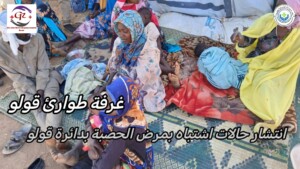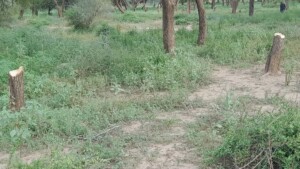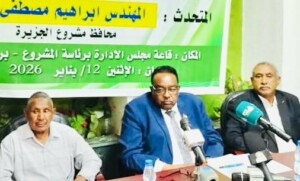Floods devastate homes, crops, livestock in Sudan’s El Gezira
Torrential rains and flash floods last week caused widespread devastation in Sudan’s El Gezira.
 Flood in El Kirwiya village in El Gurashi locality, El Gezira state last week (social media)
Flood in El Kirwiya village in El Gurashi locality, El Gezira state last week (social media)
Torrential rains and flash floods last week caused widespread devastation in Sudan’s El Gezira state.
Civil society organisations in El Gezira report that more than 1,000 houses were flooded in the state. In El Managil and El Gurashi localities, thousands of acres of summer crops were destroyed and large numbers of animals died. Villages and settlements across the state are still cut-off by flood waters, posing health risks to residents and threatening with environmental disaster.
Civil society organisations in El Gezira have called for aid to the affected people in the villages of Hashaba and in the south and centre of the state and all the villages affected by the recent rains.
As reported by Radio Dabanga earlier this week, a child drowned in floods in southern Khartoum on Thursday. More than 5,000 homes collapsed. In White Nile state, three people died and more than 1,200 houses were destroyed due to torrential rains earlier this week. People warn against “catastrophic health conditions” if the authorities do not intervene.
Ministry of Health
According to the Sudanese Ministry of Health 46 people died in the country last week as a result of heavy rainfall and flash floods.
A total of 9,260 houses collapsed, of which 595 entirely and 3,317 partially, the Undersecretary of the Health Ministry, Suleiman Abdeljabbar told reporters in Khartoum on Thursday.
He said that 154 places in 25 localities have been affected by the rains.
At least 1,606 heads of livestock were lost in the country, he added. 127 public facilities have been affected, including mosques, schools, health centres, and other government institutions.
Agricultural failure
Mohamed El Jak, Professor of Economics at the University of Khartoum, has warned in a statement this week against the failure of the current agricultural season in light of a bundle of challenges that threaten to reduce the cultivated areas from nine million feddans to less than half of that
He said that these challenges are represented by the acute shortage of inputs of fuel, seed, and fertilisers due to the deficit of government funding resulting from the decrease in public revenues during the past year, in addition to the decrease in the number of transport vehicles and the lack of cash to pay the expenses of agricultural labour.
He called on relevant parties to exert more efforts to overcome these challenges in a short time to save the agricultural season from failure to ease economic pressure on the citizens.
Ongoing shortages
As reported by Radio Dabanga in July, farmers in Sudan complain about the shortage of fuel, seed, and fertilisers, while prices tripled and labourers demand increased wages.
Minister of Agriculture Babikir Osman stated at the time that the agricultural sector is facing several challenges during the current rainy season that began in May-June, “most notably the transport of fuel to the farms, and shortages and high prices of seeds and fertilizers in some agricultural areas”.
Member of the Agricultural Chamber of El Gedaref, Hasan Zaroug, confirmed to Radio Dabanga that the current season is threatened because of the disrupted supply of diesel. Especially small farmers are affected.
Our editorial independence means that we can continue to provide factual updates about political developments to Sudanese and international actors, educate people about how to avoid outbreaks of infectious diseases, and provide a window to the world for those in all corners of Sudan. Support Radio Dabanga for as little as €2.50, the equivalent of a cup of coffee.












 and then
and then